The US Naval Institute has posted some links to their archives. This one is interesting: a 1912 think piece on the future of the submarine, written by then-lieutenant C W Nimitz.
War and Peace
The Beginning of the Okinawa Campaign — Plus 75 years
In the press of events related to the Great Wuhan Coronavirus Pandemic, many anniversaries of the Second World War have been passing by with little notice and less comment. For example, April 1st 2020 was the 75th Anniversary of the April 1st 1945 “Love-Day” landings on the western shores of Okinawa.
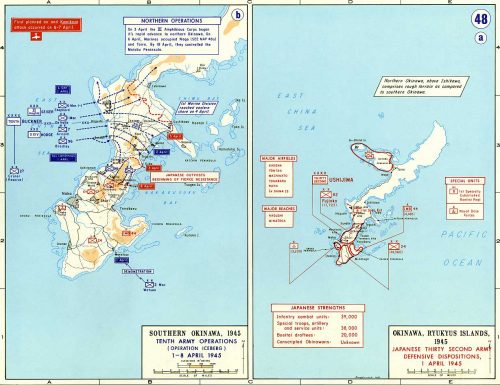
The Okinawa campaign in WW2 has often been described as marking the end old style total war. Where “cork screw and blow torch” close combat to the death between American attackers “who fought to live” and Japanese defenders who “died in order to fight” played out its last dance.
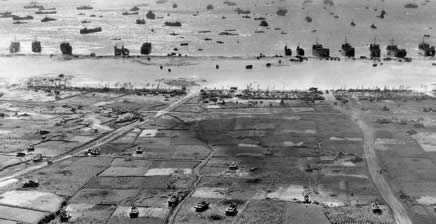
Upon closer examination, as this 75th anniversary article series will demonstrate, Okinawa is far better described as a high tech war for the electromagnetic spectrum between technological peer competitors air and naval forces. A “secret radar war,” if you will, where two opposing command, control, communications and intelligence (C3I) sensor networks were directing land, sea and air forces in a series of both combat and logistical moves and countermoves.
And while the less advanced, and organizationally deficient, Japanese military lost Okinawa proper. It still took advantage of the primarily US Navy institutional biases, American military inter-service rivalries, logistical planning weaknesses caused by that rivalry and US Navy’s unwillingness to learn from “non-approved” sources to never the less defeat the US Navy’s original Phase III plan to overrun the upper Ryukyu’s and install island air and radar bases close enough Kyushu to properly provide land based air superiority for the invasion of Japan.
These campaign objective failures were hidden in tales of US Navy destroyer picket heroism in the “Fleet That Came to Stay:…and classified top secret files…because of the coming budget war associated with the pending merger of the War and Navy department’s into the Department of Defense. After 75 years, this series will part the curtains on these hidden histories.
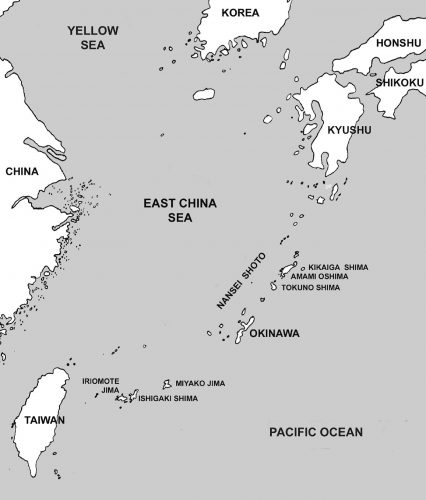
Too accomplish that objective, this series will examine the planned goals of the Operation Iceberg campaign against what was accomplished. How various American military institutions, doctrine and planning failed. And why the defeat of the US Navy’s Phase III plans set the stage for an American blood bath of preventable naval casualties during the planned Operation Olympic assault of the Japanese home islands, had the atomic bombings of Hiroshima and Nagasaki not made the invasion of Japan unnecessary.

Flashy Himself – A Literary Diversion
So it took a link on Powerline last week to bring to my attention that George McDonald Fraser’s first Flashman book came out fifty years ago.
My, I don’t know how the time flies but it does. I must have read the first couple of Flashy’s adventures sometime in college, shortly thereafter, and being quite the history nerd even then, they were rowdy enough, and amusing enough that I read most of the rest of them when they came out, even if I had to order them from an English book catalog when I was stationed overseas. I do remember very well reading The General Danced at Dawn, in the back of one of my more boring lecture classes at CSUN and nearly self-strangulating in trying to not laugh uproariously out loud. The professor lecturer would not have been amused he was a medieval history expert with a thoroughly tedious interest in the most comprehensively boring of early dark age church confabulations and absent any detectable sense of humor.
My main regret as far as the Flashman series goes is that GMF never wrote of Flashy’s adventures in our own Civil War, which sounded from references in other books, as if Flashman conducted himself in the manner which we came to expect of him that is, purely and basely devoted to the preservation of his own skin, while dodging, lying, fornicating and back-stabbing on battlefields spread across three continents, as well as hob-nobbing socially or sexually with all sorts of likely participants. As one early reviewer put it, Flashy saw 19th century history briefly over his shoulder as he fled down the corridors of power at high speed. His adventures in our very own Civil War would have been … interesting, although when I touched on this matter before, a reader pointed out that a) Flashy was a British officer and hardly gave a toss as to what we recalcitrant ex-Colonials got up to, and that b) that all our native ACW experts, amateur and professional alike would have made passionate objection to any error or omission, fancied or with historical backing that GMF might have worked into the plot. So, the effort wouldn’t have been worth the candle to him … although I and most of his fans would have loved to read it anyway. Just to see the process by how Flashy got suckered into participation by Abraham Lincoln, fought on both sides, and wound up being pals with George Armstrong Custer and well-acquainted with General Grant, and how many other Civil War notables.
I myself would have loved to see Flashy entangled in some kind of partnership with Elizabeth Van Lew, the Richmond spy queen, or perhaps a much deeper entanglement with Allan Pinkerton, of the national detective agency … it all would have been great reading, no matter how contentious the fallout might have been with Civil War historians. His take on Robert E. Lee and other Confederate generals would have been interesting, as well. Because GMF had the eye, an absolute gift for writing 19th century dialog, and loved history enough to go into the deep weeds about it all … and most of all, make it interesting to the reader. Pop media is not downhill from culture, it’s in a symbiotic relationship with it. One shapes the other, mutually.
Pres. Trump Sends Iran’s “Red Napoleon” to Meet The Reaper
On Friday night Jan 3, 2020, President Trump directed a successful strike killing IRGC Commander Gen. Qassem Soleiman at the Baghdad International Airport. Four AGM-114N Metal Augmented Charge (MAC) Thermobaric Hellfire missiles launched from an General Atomics MQ-9 Reaper turned Soleiman’s SUV and his accompanying security SUV into funeral pyres. [1]

See full story at this Daily Mail link:
Some in the media have compared this strike to Operation Vengeance, the American military operation to kill Admiral Isoroku Yamamoto of the Imperial Japanese Navy on April 18, 1943.
The Trump Administration drone strike was in fact far more consequential than Operation Vengeance. If only because of how much more of the IRGC Quds force senior chain of command were eliminated compared to the Admiral Isoroku Yamamoto strike. And how much more important Gen. Qassem Soleiman was to Iran than Yamamoto was to Imperial Japan.
Also killed in the strike were Abu Mahdi al-Muhandis also known as Jamal Jafaar Mohammed Ali Ä€l Ebrahim, the commander of the Iraqi Shia Kata’ib Hezbollah militia and mastermind behind the December 1983 bomb attacks on U.S. and French embassies in Kuwait.
In additional to Soleiman and al-Muhandis/Ä€l Ebrahim, also killed were IRGC Brigadier General Hussein Jafari Nia, Major-General Hadi Taremi, LTC. Shahroud Mozaffari Nia and Captain Waheed Zamanian. Nor does the list end there as senior pro-Iranian Iraqi Shia PMF militia leaders Heydar Ali, Muhammed Reza al-Jaberi and Hassan Abdul Hadi, were in the second SUV struck by one of four AGM-114N Hellfire guided missiles fired by the MQ-9 Reaper.
IRAN’S RED NAPOLEON
IRGC Commander Gen. Qassem Soleiman was to Iran what Heinrich Himmler, Gen Oberst Kurt Daluege, Gen Ernst Kaltenbrunner and Gen Sepp Dietrich were to Nazi Germany, all rolled into one.
In many ways Gen. Qassem Soleiman ran Iran’s foreign policy and strategy as principal adviser to the theocratic leadership. Soleiman made his bones in the 1990’s suppressing Iranian student riots in the style of Belisarius and the Nika riots. Post 9/11/2001, he has been orchestrating the killings of US service personnel, is the architect Iran’s proxy forces in Iraq, Lebanon, Syria and Yeman and ran covert ops forces world wide.
In fact, Gen. Qassem Soleiman was Iran’s “Red Napoleon.”
The idea of “The Red Napoleon” came from the 1929 novel of that name by Floyd Gibbons predicting a Soviet conquest of Europe and invasion of America by The Red Napoleon’s massive multi-racial army. Written as a screed against white racial supremacy, the concept in the Western Left of a 3rd World military leader who could routinely defeat the West over and over again the same way that General and later French Emperor Bonaparte Napoleon did to the leaders of Western Europe in the late 18th and early 19th century has hung on in the Left’s Noosphere [2] in the decades since.
If anyone was a “Red Napoleon” in the 21st century, Gen. Qassem Soleiman was that man.
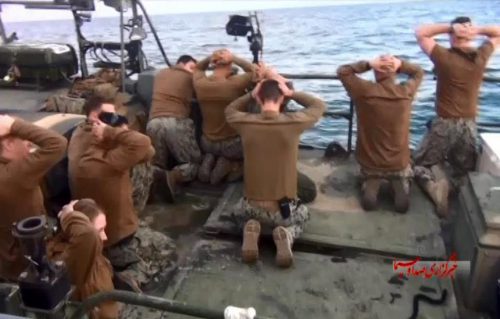
Gen. Qassem Soleiman was a man from the 3rd World. One who had created and lead a team in the form of the Quds Force that had killed American servicemen in their hundreds, for decades, got a pair of US Navy riverine command boat crews to surrender in humiliation to support Pres. Obama’s “Opening to Iran” and executed both the Benghazi, Libya and Baghdad, Iraq embassy assaults.
And Pres. Trump just sent Iran’s “Red Napoleon” to “…meet the Reaper.”
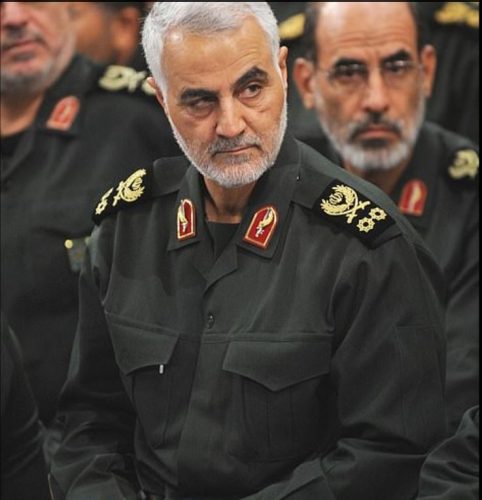
A Christmas Reading From Thomas Pynchon
I’ve always liked this passage from Thomas Pynchon’s great novel Gravity’s Rainbow.
The setting: it is the grim winter of 1944, just before Christmas. The military situation in Europe is not good, and WWII seems as if it will never end. London is under attack by V-2 rockets and V-1 cruise missiles (as they would be called today.) Roger and Jessica, two of the main characters, are driving in a rural area in England and come upon a church where carols are being sung. They decide to go inside.
They walked through the tracks of all the others in the snow, she gravely on his arm, wind blowing her hair to snarls, heels slipping once on ice. “To hear the music,” he explained.
Tonight’s scratch choir was all male, epauletted shoulders visible under the wide necks of white robes, and many faces nearly as white with the exhaustion of soaked and muddy fields, midwatches, cables strummed by the nervous balloons sunfishing in the clouds, tents whose lights inside shone nuclear at twilight, soullike, through the cross-hatched walls, turning canvas to fine gauze, while the wind drummed there…..The children are away dreaming, but the Empire has no place for dreams and it’s Adults Only in here tonight, here in this refuge with the lamps burning deep, in pre-Cambrian exhalation, savory as food cooking, heavy as soot. And 60 miles up the rockets hanging the measureless instant over the black North Sea before the fall, ever faster, to orange heat, Christmas star, in helpless plunge to Earth. Lower in the sky the flying bombs are out too, roaring like the Adversary, seeking whom they may devour. It’s a long walk home tonight. Listen to this mock-angel singing, let your communion be at least in listening, even if they are not spokesmen for your exact hopes, your exact, darkest terror, listen. There must have been evensong here long before the news of Christ. Surely for as long as there have been nights bad as this one–something to raise the possibility of another night that could actually, with love and cockcrows, light the path home, banish the Adversary, destroy the boundaries between our lands, our bodies, our stories, all false, about who we are: for the one night, leaving only the clear way home and the memory of the infant you saw, almost too frail, there’s too much shit in these streets, camels and other beasts stir heavily outside, each hoof a chance to wipe him out…….But on the way home tonight, you wish you’d picked him up, held him a bit. Just held him, very close to your heart, his cheek by the hollow of your shoulder, full of sleep. As if it were you who could, somehow, save him. For the moment not caring who you’re supposed to be registered as. For the moment, anyway, no longer who the Caesars say you are.
O Jesu parvule
Nach dir is mir so weh…
So this pickup group, these exiles and horny kids, sullen civilians called up in their middle age…….give you this evensong, climaxing now with its rising fragment of some ancient scale, voices overlapping three and fourfold, filling the entire hollow of the church–no counterfeit baby, no announcement of the Kingdom, not even a try at warming or lighting this terrible night, only, damn us, our scruffy obligatory little cry, our maximum reach outward–praise be to God!–for you to take back to your war-address, your war-identity, across the snow’s footprints and tire tracks finally to the path you must create by yourself, alone in the dark. Whether you want it or not, whatever seas you have crossed, the way home…